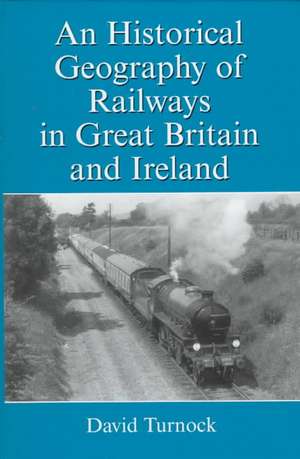An Historical Geography of Railways in Great Britain and Ireland
Autor David Turnocken Limba Engleză Hardback – 27 mai 1998
Preț: 1009.76 lei
Preț vechi: 1231.42 lei
-18% Nou
Puncte Express: 1515
Preț estimativ în valută:
193.21€ • 202.46$ • 159.73£
193.21€ • 202.46$ • 159.73£
Carte tipărită la comandă
Livrare economică 11-25 aprilie
Preluare comenzi: 021 569.72.76
Specificații
ISBN-13: 9781859284506
ISBN-10: 1859284507
Pagini: 394
Ilustrații: Includes 31 figures
Dimensiuni: 156 x 234 x 22 mm
Greutate: 0.73 kg
Ediția:New ed
Editura: Taylor & Francis
Colecția Routledge
Locul publicării:Oxford, United Kingdom
ISBN-10: 1859284507
Pagini: 394
Ilustrații: Includes 31 figures
Dimensiuni: 156 x 234 x 22 mm
Greutate: 0.73 kg
Ediția:New ed
Editura: Taylor & Francis
Colecția Routledge
Locul publicării:Oxford, United Kingdom
Cuprins
Contents: Introduction: the railway age; Part One: Railway networks: Railways before the age of steam; England and Wales; Scotland and Ireland; Part Two: The Railway impact: Canals and ports; The towns; The countryside; Conclusion; Notes; Select Bibliography; Index.
Recenzii
'...an authoritative and detailed analysis of the development of railways in Great Britain and Ireland and their impact on spatial economic development and society...a treasure trove of information, ideas and explanation. I commend this book as a key source for anyone studying railway development and nineteenth-century Britain.' Progress in Human Geography '...a very useful synthesis, presenting detailed regional evidence in a wider context, with useful sketch maps and more than sixty pages of references.' Northern History, Vol. XXXV
Descriere
Although a great deal has been published on the economic, social and engineering history of nineteenth-century railways, the work of historical geographers has been much less conspicuous. This overview by David Turnock goes a long way towards restoring the balance. It details every important aspect of the railway’s influence on spatial distribution of economic and social change, providing a full account of the nineteenth-century geography of the British Isles seen in the context of the railway. The book reviews and explains the shape of the developing railway network, beginning with the pre-steam railways and connections between existing road and water communications and the new rail lines. The author also discusses the impact of the railways on the patterns of industrial, urban and rural change throughout the century. Throughout, the historical geography of Ireland is treated in equal detail to that of Great Britain.










